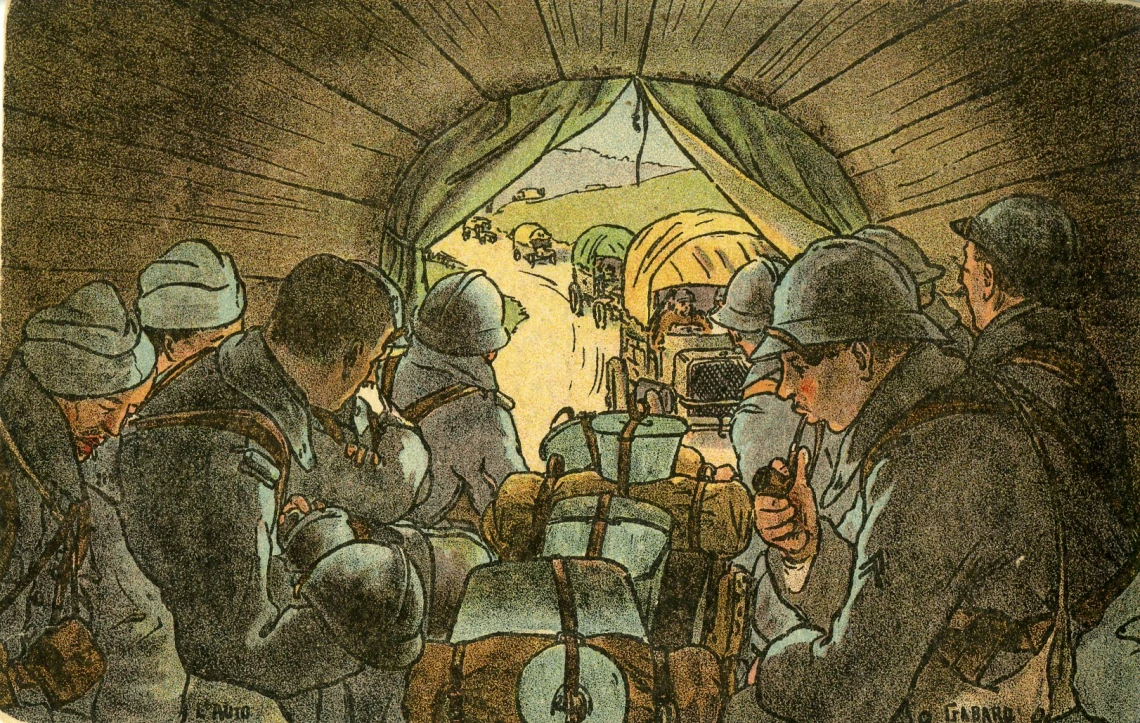Ralph Everett Ellinwood papers

Drawing of WWI Transport Drivers
Collection area: Political Affairs
Collection dates: 1881-1994
This collection includes the correspondence of Ellinwood to and from his wife, parents, family members and friends as well as personal diaries during his deployment to Europe and subsequent internment as a prisoner of war. The handwritten journals from 1917-18 detail his attempt to cope with the war and the deteriorating conditions around him. Particularly poignant are the photographs and negatives of his friends and comrades in arms from early military days and his civilian life in the 1920s. His personal scrapbook contains newspaper clippings and artifacts that track the major events of the war. In addition to several short story manuscripts by the young war veteran turned author and editor, the collection includes the authors copy and original manuscript of the now rare book Behind the German Lines, printed in early 1920.
Ralph Everett Ellinwood was born August 9, 1893 to one of the prominent families in Flagstaff, then the United States Territory of Arizona. Ralph spent his formative years in Flagstaff and the frontier mining town of Bisbee, AZ while his father Everett, an attorney, served several key roles for the territory including participation in the Arizona Constitutional Convention. After Ralph attended private secondary school in California, he headed to Massachusetts to pursue higher education at Amherst College. When the United States entered the Great War in 1917, Ralph and some of his classmates could not wait any longer for their country to mobilize troops. Ralph and other young men from across the country enlisted in the American Field Service in June, 1917.
On the western front, Ralph served as a transport driver under the direction of the French Army. When the United States Army arrived overseas, Ellinwood’s corps was integrated into the U.S. Army where he was officially enlisted on October 1, 1917. He continued to serve in the Allied cause, now with the U.S. Ambulance Corps over the war torn battlefields of France. On May 28, 1918, Ralph and his convoy were captured by German soldiers during the Third Battle of the Aisne. From the time of his capture near Soissons, Ellinwood traveled hundreds of miles as a prisoner by both foot and railroad through France and Germany. His journey included extended stays in Mont Notre Dame (June 1918) and filthy prison camps at Laon (July 1918) and Langensalza (August - November 1918). After the Armistice of November 11, 1918, Ellinwood spent his final weeks in Germany at Kassel and Frankfurt am Main before returning to French soil on January 1, 1919, seven months after he was captured.
After returning to the United States, Ralph began working on his autobiographical account of his experience and it was published in April of 1920 as Behind the German Lines. Ellinwood turned again to his love for writing and publishing and completed a degree in journalism at Columbia University. Ralph married his long time friend and companion Clare Rounsvell and worked for a newspaper in Sacramento, California for a time before the couple settled in Tucson in 1924 where Ralph became editor and co-owner of the Arizona Daily Star. Tragedy struck the Ellinwoods on August 30, 1930 when the 37 year old Ralph, son, brother, husband, and father of three young children, died suddenly of a heart attack. His life ended suddenly but his extraordinary experiences live on in this collection of memoirs, letters, artifacts, and photographs.
A collection guide explains what's in a collection. New to using our collections? Learn how to use a collection guide.
Collection guideAccess this collection
Visit us in person to access materials from this collection. Our materials are one-of-a-kind and require special care, so they can’t be checked out or taken home.
How to cite
Learn how to cite and use materials from Special Collections in your research.
